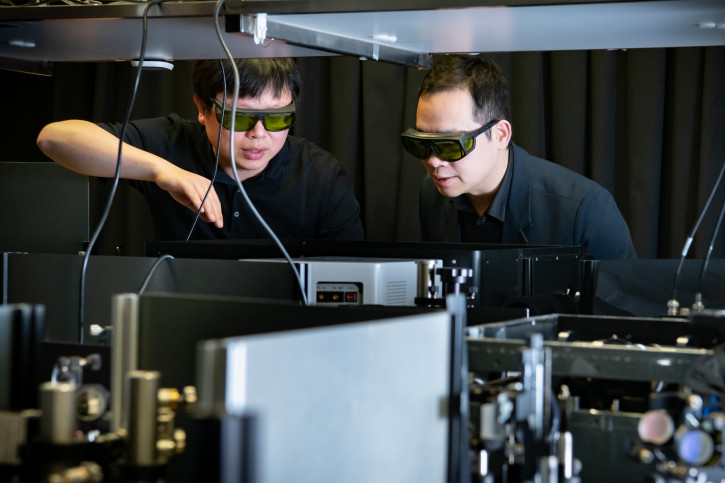Traditional spectroscopy methods require samples to be tested via multiple, separate experiments. This new technology could help scientists to test samples in just one experiment, saving them laboratory set-up time, and significantly reducing the amount of time required to analyse resulting data.

Dr Kai Chen, Co-Inventor & Peter Lai, Wellington UniVentures Commercialisation Manager.
Spectroscopy is an exploratory tool that's used by scientists—in virtually all fields of science and technology—to investigate and explore things that are too small to be seen through a microscope, e.g. molecules, and even smaller sub-atomic particles like protons, neutrons and electrons.
Conventional spectroscopy methods work by shining a spectrum of light through a sample, and then monitoring which colours are reflected or absorbed in order to see how the material responds. The process can be used to identify the nature of compounds in a sample, monitor the progress of chemical processes and assess the purity of materials. Used extensively in fields such as biomedical science—particularly in the areas of tissue analysis and medical imaging—spectroscopy is also essential to the discovery of new materials.
However, traditional spectroscopy methods only allow for one experiment to be carried out at a time, e.g. testing how one colour of light is absorbed by a sample is a separate experiment to testing how that light is reflected. Not only is the set-up for each experiment time-consuming, scientists are unable to see potential interactions between the different tests—limiting scientific understanding as a result.
Victoria University of Wellington researchers have developed a rapid spectroscopy tool that enables scientists to integrate separate spectroscopy experiments into just one—reducing the time it takes to conduct testing (and analyse the resulting data) from months down to just days—while opening up the ability for greater scientific insights.
Features and benefits
Faster experiments and analysis
New scientific insights
Being able to incorporate multiple tests into one experiment enables scientists to study data from complex interactions and obtain previously unattainable scientific insights and understanding.
High level of accuracy
Accuracy is not compromised with this novel tool; the level of accuracy is as high as traditional spectroscopy methods, if not higher.
Next steps
In 2022, the company spun out to form Advemto. The newly formed spin out successfully closed its pre-seed venture capital investment round led by Matū Karihi Fund. Joining Matū are Quidnet Ventures, SIP Innovation, Booster Innovation Fund, and Exponential Founders Fund.
With business support from Wellington UniVentures, the Advemto team have gone from building instruments to building a business. Partnering with CohPros Ltd, and working closely with component manufacturers and software engineers, they have been able to successfully bring the instrument to market. The unique and patented instrument is considered a premium product—the first turnkey solution for ultrafast spectrometer technologies.


